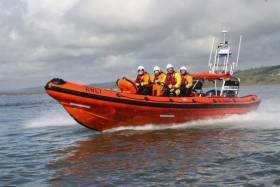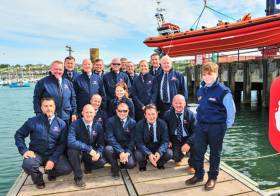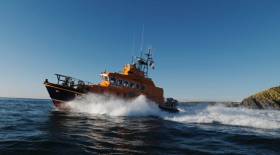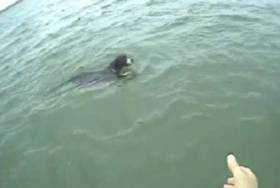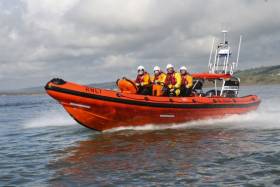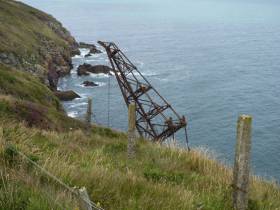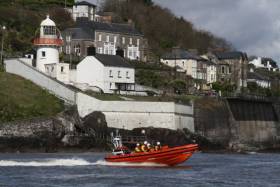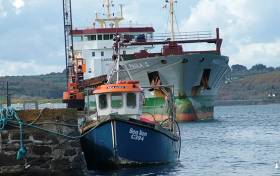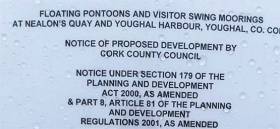Displaying items by tag: youghal
Youghal Lifeboat Launches To Man Taken Ill On Angling Boat
#RNLI - Youghal RNLI’s volunteer lifeboat crew were tasked yesterday morning (Saturday 15 October) in choppy waters to reports of a man taken ill on board a chartered angling vessel.
At 11.30am the lifeboat launched to the location around a mile and a half off Capel Island, where the casualty had been unconscious for a period and was pale in appearance.
The lifeboat crew proceeded to administer casualty care when they recovered the casualty on board.
An ambulance was also requested and was awaiting the lifeboat on its return to station, where the paramedics checked the casualty over before giving him the all clear.
Commenting on the callout, Youghal RNLI lifeboat Helm John Griffin said: “[The charter vessel operators] did the right thing in contacting us when the man became unwell.
“It’s always better to get an ill person medically checked out if there are any concerns.”
Two New RNLI Inshore Atlantic 85 Class Lifeboats Officially Named in County Cork
There were double celebrations for the RNLI in County Cork this weekend with two new lifeboats officially named and blessed in Youghal and Crosshaven.
At a special ceremony held on Saturday, Youghal RNLI officially named its new Atlantic 85 class lifeboat, Gordon and Phil, while today (Sunday 11 September) Crosshaven RNLI named its new lifeboat John and Janet.
The honour of naming Youghal’s new lifeboat went to eight-year-old Izzy O’Connell, and Albert Muckley, Deputy Launching Authority.
Izzy who was diagnosed with a brain tumour in 2014 is a friend of the station. The lifeboat crew who have admired Izzy’s determination and courage, wanted her to play a special part in their day.
Ahead of the naming, Catherine Fitzgerald Hourigan, who has held several fundraising events in aid of the station, was invited to represent the late donor Gwenda Bull, and hand the new lifeboat to the RNLI.
Peter CrowIey, RNLI Vice President, accepted the lifeboat on behalf of the RNLI before handing her over into the care of Youghal Lifeboat Station. The lifeboat was then accepted on behalf of the crew by Lifeboat Operations Manager Fergus Hopkins.
Gwenda Bull, who lived in Brighton, East Sussex, admired the work of the RNLI as did her family. She funded various equipment for Shoreham lifeboat station and went to see the new Tamar lifeboat arrive at Shoreham back in December 2010.
Miss Bull also kindly funded the purchase of a new inshore lifeboat, to be named Gordon and Phil in memory of her parents. She was happy for the lifeboat to go on station wherever it would be of most benefit around the coast, so her funds were used to purchase the new B class lifeboat in Youghal.
Mr Hopkins remembered and thanked Miss Bull, adding that her generosity had given Youghal RNLI a lifesaver.
‘When the crew arrive here,’ he said, ‘and get kitted up, and head out to sea, we’ll have peace of mind. Because this lifeboat will help to keep them safe, as they save others’.
Pat O’Keefe, fundraising committee member recounted a historical call out before the Very Reverend David Herlihy, Parish Priest, the Very Reverend Alan Marley and the Reverend Tim Kingston lead the Service of dedication. Izzy and Albert then officially named the lifeboat Gordon and Phil, while pouring a bottle of champagne over the lifeboat which then put to sea.
The new lifeboat replaced Patricia Jennings which during her 13 years in Youghal launched 175 times with its crews saving nine lives and rescuing 233 people.
The celebrations moved to Crosshaven this afternoon where the honour of naming the lifeboat went to young Paddy Crowley, son of the late Con, who was a helm at the station prior to his sudden death last year.
Afloat journalist Tom MacSweeney was invited to represent the anonymous donor of the new lifeboat John and Janet and hand her over to the RNLI.
Speaking at the ceremony, Mr MacSweeney said: ‘On this occasion, the incredibly generous donor of this new lifeboat has decided to remain anonymous. We can all agree this is an incredible act of kindness and so I offer my sincere thanks to the donor and I know this lifeboat will be a much loved asset to the community of Crosshaven.’
Clayton Love, RNLI Vice President, accepted the lifeboat on behalf of the RNLI and handed her into the care of the Crosshaven lifeboat crew. It was Mr Love’s family who kindly donated the station’s former lifeboat, Miss Betty.
On accepting the lifeboat, Patsy Fegan, Lifeboat Operations Manager said: ‘People from all walks of life represent our volunteers who without a thought at any time day or night will drop everything when their pager goes off and come down to the station. When the crew arrive here, they prepare themselves and the boat, don their suits and go to sea to save the lives of others. This new Atlantic 85 class lifeboat will help to keep our volunteer crew safe, as they rescue others.’
The Very Reverend Fr Pat Stevenson and Reverend Isobel Jackson lead the Service of Dedication before Paddy Crowley, son of the late Con, officially named the lifeboat John and Janet.
Last year, Crosshaven RNLI launched 42 times and rescued 50 people. The new lifeboat replaces Miss Betty, the station’s first permanent lifeboat, which was on service in Crosshaven since the station was formally established 14 years ago.
The new state of the art Atlantic 85 lifeboat was introduced into the RNLI fleet in 2005. The lifeboat is 8.4 metres in length and weighs 1.8 tonnes. Improvements on its predecessor include a faster top speed of 35 knots, radar, provision for a fourth crew member and more space for survivors.
Fast, manoeuvrable and reliable, the B class operates in rough weather conditions, capable in daylight up to force seven and at night, to force six winds.
The new lifeboat, an Atlantic 85 is the latest version of the B class.
Ballycotton Lifeboat Rescues Child Adrift On Inflatable Dinghy
#RNLI - Ballycotton RNLI rescued a child yesterday evening (Thursday 4 August) after an offshore breeze pulled her inflatable dinghy out to sea.
Ballycotton’s all-weather lifeboat, under coxswain Eolan Walsh, was launched around 5.30pm after the nine-year-old girl got into difficulty off Ardnahinch beach.
Valentia Coast Guard was quickly alerted and then requested the volunteer crew members from Ballycotton and Youghal RNLI to launch their all-weather and inshore lifeboats.
Although weather conditions were calm, an offshore breeze blew the inflatable dinghy out to sea with the girl clinging on.
Ballycotton's inshore boarding boat was first to arrive on scene, shortly followed by the all-weather lifeboat.
The girl was brought onboard the inshore lifeboat where she was assessed and found to be safe and well but in a distressed state. She was assisted by the crew member and brought back safely to her parents on the beach.
"This was a frightening experience for the young girl and her family and we would like to wish them all well following their ordeal," said Walsh after the callout.
"Thankfully, the alarm was raised quickly and the casualty was wearing a suitable buoyancy aid which attributed to a positive outcome."
Walsh added that "while the coast is a great place for young people and families to enjoy, we would remind everyone to respect the water, to understand the risks and to stay safe.
"When using a dinghy, always make sure you wear an appropriate lifejacket or buoyancy aid; always carry a means of calling or signalling for help.
"Check the weather forecasts and tide times before you go and if on your own, tell someone about your plans – where you intend to go and when you expect to return, and know how to contact the coastguard."
Youghal Lifeboat Rescues Dog On Launch To Boat In Difficulty
#RNLI - The volunteer crew of Youghal lifeboat were requested to launch on Saturday afternoon (30 July) to reports of a dive boat with engine failure south of Ram Head with two people onboard.
With an updated position received from the Irish Coast Guard, Youghal RNLI located the vessel with the two men safely onboard and wearing their lifejackets.
The lifeboat, with helm Jason Ansbro and crew members Erik Brooks, Kevin Daly and Liam Keogh, took the boat under tow to Knockadoon Pier.
While en route, the crew received a call from the lifeboat station to say there was a dog swimming out to sea at Pilmore beach. After securing the vessel at Knockadoon, the lifeboat proceeded to Pilmore in search of the dog, locating it with the help of the Youghal Coast Guard unit on the beach and recovering the animal onboard the lifeboat.
After some reassurance, the dog seemed happy and unharmed by his adventure, and he was returned to the safety of the beach.
It later emerged that the dog and its owners were walking on Pilmore beach exercising an injury from the previous week, when the dog broke free from his lead and made a dash for the water.
Weather conditions at the time were dry with a light north-westerly breeze and calm sea.
Speaking after the event, lifeboat helm Jason Ansbro said: "When walking dogs on the beach, people should be vigilant as they can get into difficulty very quickly, and to make sure and not go into the water after them if they do."
Youghal Lifeboat Launches Twice In One Day To Reports Of Engine Trouble, Missing Person
#RNLI - Youghal RNLI in East Cork was requested to launch twice this past Sunday (24 July) to separate reports of a boat with engine trouble and a missing person.
The volunteer lifeboat crew were first called upon to launch their Atlantic 85 inshore lifeboat at 12.40pm following a report that a small inflatable boat with two people onboard had appeared to have engine trouble somewhere between Youghal Lighthouse and East Point in Youghal Bay.
Weather conditions at the time were described as good, with a south westerly gentle wind blowing and a slight swell.
Once on scene, the lifeboat crew observed that the boat had made its way to shore near Moll Goggin's Corner. The two men with it were safe and well and happy to recover the boat themselves.
Speaking following the callout, Youghal RNLI helm Jason Ansbro said: "A member of the public on Lighthouse Hill did the right thing this afternoon and raised the alarm when they felt someone was in difficulty.
"Both men onboard were sensible and wearing lifejackets at the time."
The second callout of the day came at 10.45pm, when the lifeboat was requested to join in a search for a person reported missing in the water on the Waterford side of Youghal Bridge.
Youghal Coast Guard Unit and the Irish Coast Guard helicopter Rescue 117 from Waterford were also involved. But local Garda soon informed the rescue services that they were happy that nobody was missing and asked all agencies to stand down.
Man Dies While Diving Off Waterford Coast
#Diving - A man has died after getting into difficulty while diving off Ardmore in Co Waterford yesterday afternoon (Sunday 12 June).
Youghal RNLI's volunteer lifeboat crew were tasked to the incident between Goat Island and Ram Head near Ardmore, Co Waterford before 4.30pm.
On arrival they found a man in the water who they recovered onto the lifeboat, and immediately administered casualty care.
Working with Helvick Head RNLI, who were also on scene, the casualty was winched onto the Irish Coast Guard helicopter Rescue 117 and brought to Waterford University Hospital, where he was later pronounced dead, as the Irish Examiner reports.
A spokesperson for Helvick Head RNLI that a second diver who had been with the deceased had managed to swim to shore to raise the alarm, allowing for a swift emergency response.
Commenting on the callout, Youghal RNLI lifeboat operations manager Fergus Hopkins said: "This was a difficult callout for everyone concerned and our thoughts are with the family of the man who was taken from the water this afternoon."
New Atlantic 85 Class Lifeboat Arrives At Youghal RNLI
#RNLI - A new Atlantic 85 class lifeboat has gone on service at Youghal RNLI.
The lifeboat, which arrived at the east Cork lifeboat station on Monday evening (11 April), replaces Patricia Jennings, which has been used to save lives at sea in East Cork since 2002.
Yesterday afternoon (Tuesday 12 April) the volunteer lifeboat crew began a week of familiarisation training with their first exercise on the Gordon and Phil.
The new lifeboat has been funded through a legacy from the late Gwenda Bull, a native of Brighton in East Sussex, England, who was a supporter of the charity’s volunteers in saving lives at sea.
The lifeboat Gordon and Phil is named after Gwenda’s parents in their memory. Prior to her death at the age of 82 in 2013, Gwenda who lived near Shoreham lifeboat station which she visited regularly, said her family had always admired the wonderful work of the RNLI.
The Gordon and Phil will be officially named at a special naming ceremony and service of dedication at Youghal lifeboat station later this year.
In her 14 years in Youghal, Patricia Jennings launched 175 times, with its volunteer lifeboat crew rescuing 233 people, nine of whom were lives saved.
The new lifeboat has some advancement on its predecessor. The Atlantic 85 design allows room for four crew members and more kit than the Atlantic 75 lifeboat, which only had room for three crew members.
The lifeboat is powered by two 115-HP engines and has a stronger hull and greater top speed of 35 knots. The added radar allows the crew to operate more effectively in poor visibility and there is also VHF direction-finding equipment.
The vessel has a manually operated self-righting mechanism which combined with inversion-proofed engines keeps the lifeboat operational even after capsize. The lifeboat can also be beached in an emergency without causing damage to its engines or steering gear.
The Atlantic 85, which was introduced to the RNLI fleet in 2005 also carries a full suite of communication and electronic navigation aids, as well as a searchlight, night-vision equipment and flares for night-time operations.
Speaking following the arrival of the new lifeboat, Youghal RNLI lifeboat operations manager Fergus Hopkins said: "We are extremely grateful to Gwenda Bull for her generous legacy donation which has funded our new lifeboat.
"As we welcome a new lifeboat, there is also a sense of nostalgia among us today too as we bid a fond farewell to Patricia Jennings who provided us with 12 great years of service. Patricia Jennings time here in Youghal saved lives and brought many more people safely to shore and we hope her donor family will be just as proud as we are, of her many achievements.
"We are looking forward to being the custodians of this new lifeboat which will allow our volunteers to go on to rescue and save many more lives in the years to come."
Sailing By & What You Didn’t Hear About Admiral Nelson
When that lovely piece of music, SAILING BY, rolls from the studio presentation desk through my headphones, I feel a sense of enjoyment at being able to bring a wide tapestry of news, information, stories about the culture, history and the maritime tradition to listeners so many of whom tell me that Ronnie Aldrich’s playing of the programme’s theme music on the LP ‘Sea Dreams’ sets the scene for them. I hope it does for you too because, sitting in the studios of Community Radio Youghal on the East Coast of County Cork, where the sea rolls in from Capel Island and other offshore points, my intention is to make a programme bringing together the maritime community. The response is encouraging and I am grateful to listeners who regularly suggest story lines. The current edition is my 46th programme from the radio studios in Youghal, a town with a huge maritime tradition. It was once the biggest port in the Republic. It was a town with a great schooner tradition, trading to the British coast. There were tragedies when families suffered great losses. The town was chosen as the location for the filming of the famous ‘Moby Dick’ epic. It has gone through a period of industrial decline. Every year it remembers those who have died at sea. It is again looking to build up its maritime resources. It has potential as a cruising port-of-call.
I have devised the programme as Ireland’s maritime programme, broadcast through the community radio service and on Afloat.ie to highlight the importance of the maritime sector to an island nation. The programme of news, stories and information from around the Irish coastline, rivers and lakes, connects the ‘family of the sea’ and relates this connection to the oceans of the world.
In the current edition we travel from Bloody Foreland in County Donegal where we hear about navigational changes noted by the Commissioners of Irish Lights, through connections in Offaly to Dublin Port’s famous Diving Bell and a new song about it by an Irish balladeer who has moved from Liffeyside to Holland. He gives us the honour of being the first to broadcast his composition. With a call to Cork to meet ‘the Irish father of ocean energy,’ and hear how he is concerned about lack of public knowledge of the value of marine energy, we are told a story that has not been mentioned in other media as they recall the blowing up of Nelson’s Pillar in Dublin 50 years ago. There is much more to know about Admiral Nelson as we hear how he defended an Irish revolutionary who wanted to kill the King of England. Together with reports from lifeboat stations around the country and the dominance of Clare in lifesaving, all of these stories make up the wide maritime tapestry of the latest edition of THIS ISLAND NATION which you can hear here.
I hope, like myself, that you enjoy this voyage around the maritime sphere of Ireland and, if you would like to contact the programme, the Email address is: [email protected]
Mooring & Pontoon Development in Youghal Harbour
Floating pontoons and visitors swing moorings at Nealon's Quay and Youghal have been proposed by Cork County Council. The plans of the long overdue development are available for inspection at County Hall in Cork over the next six weeks.
Installation includes 'steel piles, access gangway, visitor swing moorings and associated indfrastructure' according to the notice that is posted below.
The notice follows a story on January 13th on Afloat.ie that pointed to pontoon development on the south coast town. A local pressure group, however, indicated that talk of a 'much needed' town marina was premature.
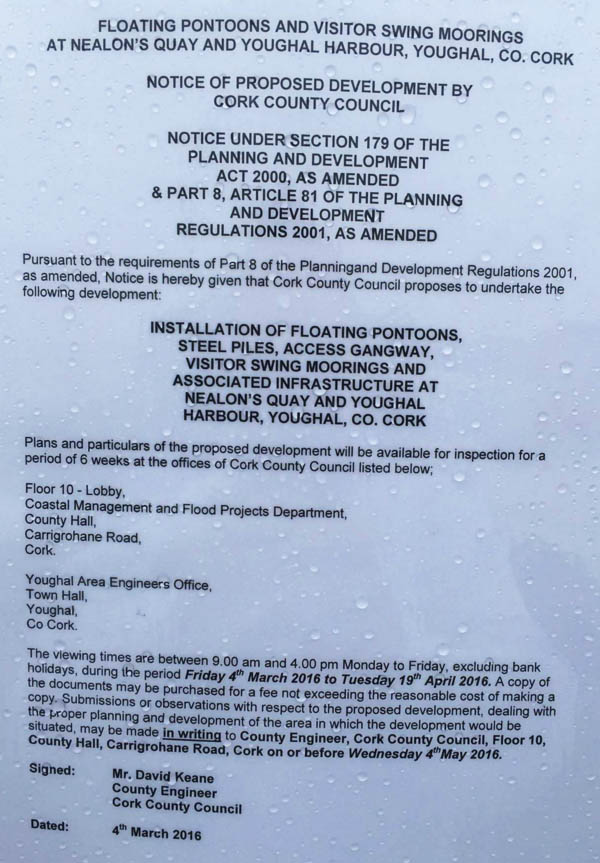
Narrow Margin Between Life And Death At Sea
Listening to a seafarer describe how colleagues from his native town left port on a night of very bad weather, when their Skipper was advised not to go by other Skippers, I thought of how there can be a very narrow margin between life and death.
Those men and their vessel never made it from the British coastline to Youghal in East Cork, which was once the biggest and busiest seaport in the Republic.
Youghal is a seaside town which has suffered heavily in recent years from recessionary impact and decline of industry in the area. Hundreds of jobs have been lost. It is a seaside town which, before the advent of cheap air travel to foreign locations, was a dominant holiday resort. It is where the famous ‘Moby Dick’ film was shot, chosen because of its maritime appearance. It is a town which is legendary for its schooners and schoonermen, trading from Ireland across the Irish Sea to the UK.
It is also where I present THIS ISLAND NATION radio programme on the town’s community radio station, CRY104FM, every Monday night ad from where it is also transmitted to other stations in Dublin, Dundalk, Athlone, Galway, Clare and Cork and here to the Afloat website. It is introduced with the theme music which caught the attention of listeners during my 20 years presenting SEASCAPES on RTE Radio, ‘Sailing By.’ This is the version of that tune played by another sailor, Ronnie Aldrich from the Isle of Man and his orchestra on his LP, ‘Sea Dreams.’ RTE dropped it as the programme’s theme tune after I left, but it is indelibly associated with the maritime sector, another version being used by BBC Radio for its late night sea area weather forecast, played by Ronald Binge and the BBC Light Orchestra. So I resurrected it for my new programme and it has again attracted considerable attention around the nation and abroad, where the programme is also transmitted through Mixcloud and Tune In Radio.
Listening to the interview of Pa Ahern, then an Able Seaman on another legendary Youghal vessel, the Kathleen and May, as we transmitted it, I heard him tell his story of sailing on that ship and how, when he went on board for the first time, he knelt down and kissed the wood of the ship: “I don’t know why I did it, I had it done before I knew it,” he told the interviewer, Noel Cronin, in a recording from the station’s archives. Pa is deceased but, through my headphones, his voice brought alive the scene he described on a night of very bad weather, when another Youghal schooner, the Nellie Fleming, sailed that fateful night and the five men crewing her, all from Youghal, died. Pa described how the Skipper of the Kathleen and May which he was aboard, also decided to sail, but the weather was so bad that a crewman told him he would kill them all and the Skipper turned the ship around and they headed back into port, which was a “tough struggle against the conditions”. Pa been put to watching for navigation lights and described how he saw a ship in the distance in high seas driven by gale force winds, with lashing rain. “It had lost a mast, but I am sure it was the Nellie Fleming…” It was the last sight anyone saw of that vessel, which is the subject of a new book by Youghal historian and author, Mike Hackett, called ‘Lost Without Trace”. The old sailing ships were tough, demanding vessels and could be dangerous in difficult weather. There were some which did not survive. One was the Nellie Fleming, lost coincidentally in the same month of February 1936 when another major maritime event occurred on the East Cork coastline, not far from Youghal.
This was the rescue of the Daunt Rock Lightvesel crew after it broke from its moorings at the entrance to Cork Harbour. This week is the anniversary of that rescue, still regarded as the most famous in Irish lifeboat history. It was carried out by the Ballycotton Life crew under legendary Coxswain Patsy Sliney and they were all awarded medals for their courage. Unusually, so was their boat - the Mary Stanford - now ashore on permanent display in the East Cork coastal village and worth a visit if you are ever in that area.
Mike Hackett’s book tells that the Fleming family which owned the ill-fated Nellie Fleming had lost their original ‘Nellie Fleming’ vessel when it went aground at Ardmore in 1913. All the crew were saved from that shipwreck. Then, in 1916, Fleming’s purchased a vessel named ‘Emily’. It had been built at Carrickfergus in 1884. The name was changed to ‘Nellie Fleming’ and she was registered at Cork.
The Kathleen and May is the last remaining British-built wooden hull three-masted topsail schooner. Registered in Bideford, North Devon, there have been several attempts to restore and preserve her. Last heard of she was based in Liverpool and listed as part of the UK National Historic Fleet.
How did the Kathleen and May get back into port safely that bad February night? Pat Ahern said it had an engine: “Without it we would never have got back.”
These stories underline for me how narrow is the margin between life-and-death.
• Listen above to the programme on the Afloat website



























